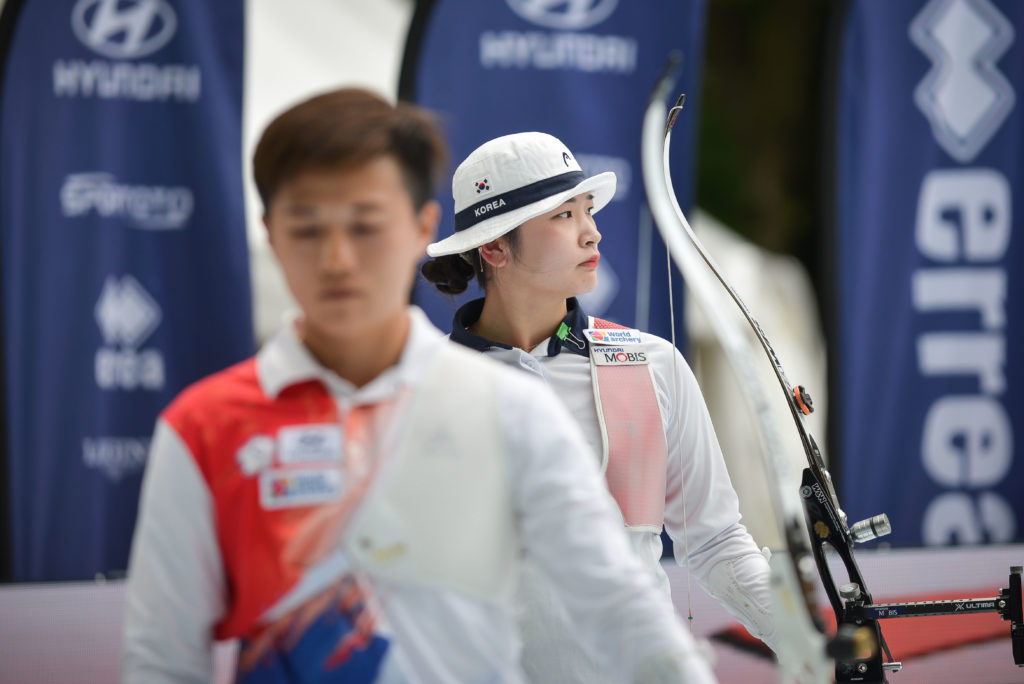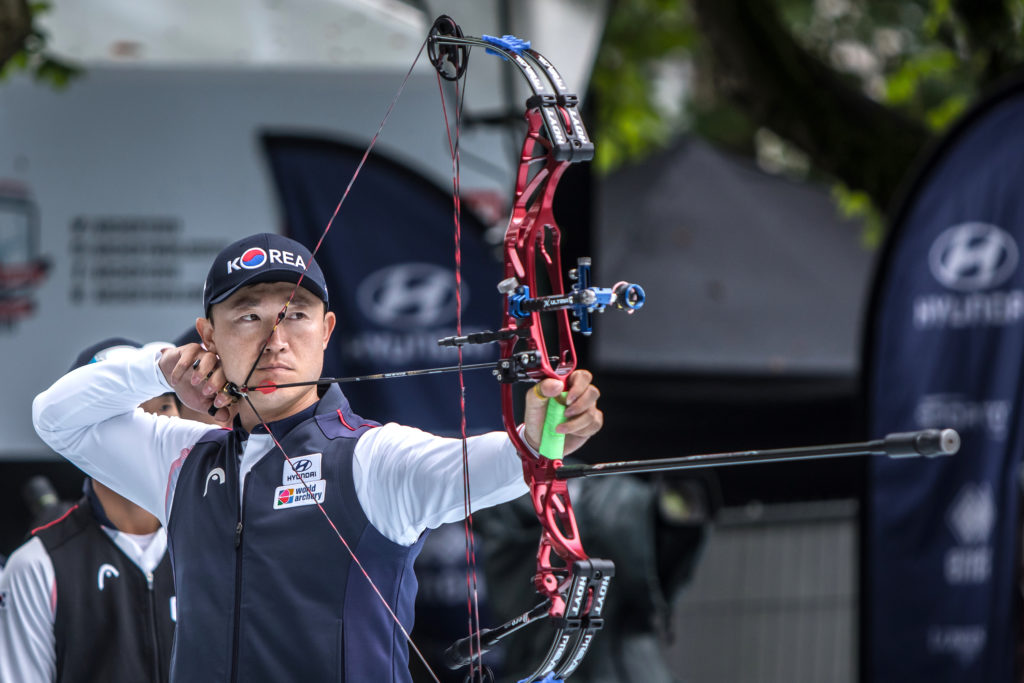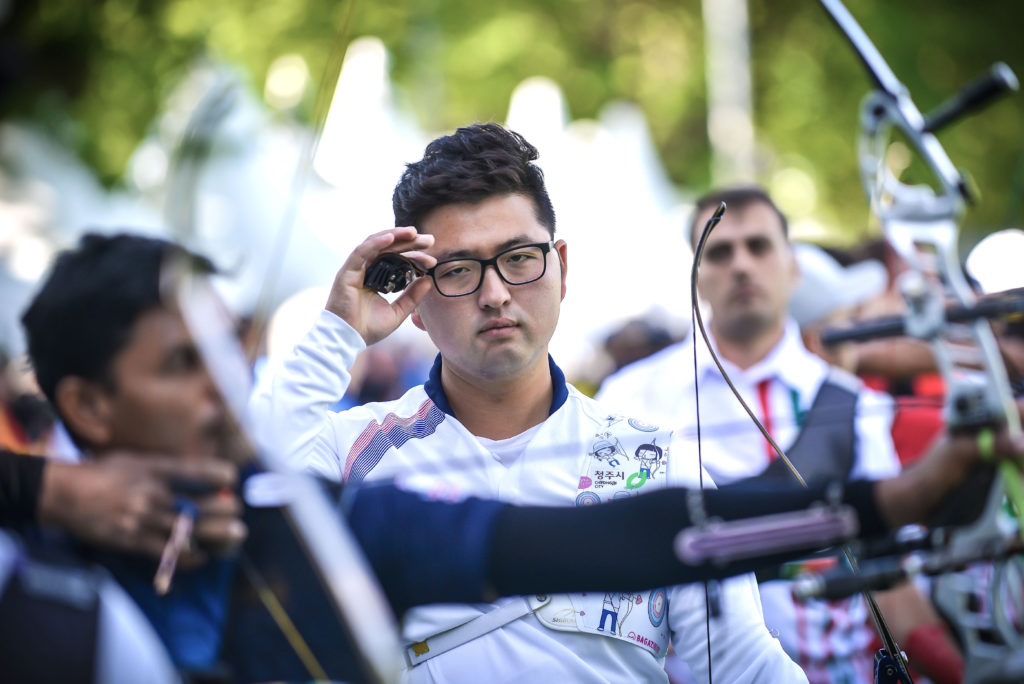
The disaster for the Korean squad in Den Bosch had been on the cards for a while. While everyone involved in archery, and many in the wider world of sport, knows about the dominance of South Korean recurve teams, especially at the Olympics, it was less clear how the results over the past year had – perhaps – indicated that things were not quite as they once were.
The previous World Championships record was formidable. A Korean man had held the title for 12 of the last 13 editions – the run only being broken by Michele Frangilli of Italy in 2003. But in 2019, for the first time since 1993, no Korean man contested the final – or even the bronze medal match.
In the individual eliminations, Lee Seungyun, in the round of 32, was outshot by Sanzhar Mussayev of Kazakhstan. In the same round, Lee Woo Seok fell to former Olympic champion Marco Galiazzo. There was no mystery as to why: Woo Seok started fairly slowly and the Italian found three 29s in a row to sink the top seed. Then Kim Woojin fell to Ruman Shana of Bangladesh in the next round, the Korean uncharacteristically shooting three 27s in a row. Shana, the man-of-the-match in Den Bosch, took full advantage.
Although the men and women easily secured Olympic qualification, the men’s team were soon beaten in the semifinal by a youthful Chinese team, leading to them only contesting the bronze final in Den Bosch.
On finals day, it got much worse for the women, losing both the world team title and the women’s individual title to tough and disciplined shooting from Chinese Taipei, who finally, and deservedly, made a long-awaited international breakthrough against their primary rivals.
Kang Chae Young’s extraordinary achievements this season, including back-to-back World Cup titles, and breaking her own world record in qualification – somehow fell away in matchplay in Den Bosch. The individual final saw her force a shoot-off, but then deliver a disastrous seven to lose the title. The only high point for the recurve teams was retaining, for the fifth championships in a row, the mixed team title.
The compound team fell far short of their medal target too, with just a single athlete (Kim Jongho) in individual finals, and So Chaewon, who had been performing at the highest levels all season, going out after shooting a miss in matchplay.
Olympic Champion Chang Hyejin seems to have slumped in form – at least by Korean standards – since a high point at the start of 2018 and has seen many early eliminations and high-profile match losses over the past year.
Most teams have captains – often ‘unofficial’ – but Korean team captains have a specific role to play, in a country that puts great emphasis on hierarchy. The men’s team captain is Kim Woojin, and as the dust settled on the results, he explained: “As a leader for the team I need to give good words before, during and after competition. Not only at the World Championships, but all the time. That’s my job as a leader.”
“The competition wasn’t so good in terms of results, and I’m disappointed. But this is not the last chance for us. We still have more chances in the future. This will be a good opportunity to build the team back up again, to prepare well and grow.”

But the losses were coming, in the sporting sense. (and were *ahem* predicted in the pages of Bow International – Ed) It’s not the first major men’s team defeat in the last twelve months; by far the worst was at the Asian Games – a huge deal in Korea and sometimes described as the ‘second Olympics’ – where they were beaten into second place by Chinese Taipei.
Nothing on paper suggests any of the three in the men’s team are anything less than the very best available. Both Kim Woojin and Lee Seungyun are both former world champions – Woojin twice – and Lee Woo Seok has been the most exciting thing in Korean archery for several years. But anyone who saw the indifferent-to-bad match Woojin and Woo Seok put on in Shanghai this year might have questioned that they were watching some of the very highest-ranked archers in the world.
The Korean system is designed to eliminate variance as much as possible and produce shooters who can perform to a consistently high level each and every time, no matter what is thrown at them. Kang Chae Young’s astonishing results in the past season are a perfect example of that system achieving its purpose.
So what, if anything, has gone wrong? I tried asking gently in Den Bosch, but unsurprisingly, none of the Korean camp wanted to talk about it, although one alluded to a lot of ominous ‘questions’ which were going to be asked when the delegation returned home. In post-match interviews, many of the athletes discussed the world championships solely as a stepping stone to the Olympics, as the archery world closes one book and starts to turn its attentions fully to Tokyo next year. If the men and ladies in white produce a repeat performance of Rio, where they swept the board, these World Championships will be seen as little more than a blip.
There is no doubt that the squad are under immense pressure. Variance and plain old luck plays its part in high-level archery, of course, and the rest of the world has been catching up for decades with Korean techniques and training methods. Qualification scores of 685+ used to be almost the sole preserve of Korean men; in Den Bosch, in perfect conditions, a total of eight men achieved that mark. They may remain the best in the world, but their advantages over the rest of the field, once enormous, have become razor thin.

Indeed, there are several men’s teams with the same level of raw skill, even if there are none with the strength in depth that the KAA has at its disposal. It should also be noted that the World Championships have quite often thrown up results that are anomalous to the elite level circuit.
Interestingly, the Korean national trials system is changing next year in advance of the Tokyo Games, and it is unlikely that this has nothing to do with the patchy results over the last year. Normally, the eight athletes in the national team each year enter next year’s qualification process at the penultimate stage in March, after training all winter at the national centre at Jincheon.
There, they fight it out with 12 archers who have made it to that stage via open qualification. For the first time, this winter all athletes will have to fight their way through open qualification to make it to that set of 20. This has – unsurprisingly – proved very unpopular among the current elite set.
Undoubtedly there will be a high-level inquest at the KAA into why the recurve teams did not perform in Den Bosch. But perhaps holding on to the big titles they see as rightfully theirs may not be easy forever, and seeing Korea lose big titles will give a psychological boost to other teams. For whatever reason, is it possible to contemplate that the era of Korean dominance might – just might – be coming to an end?
JOHN STANLEY
The original version of this article appeared on worldarchery.org


[…] to say, easier said than done – and the Koreans don’t quite pull things back together after a tricky year, an American might just be going to Tokyo as favourite for the Olympic title once […]